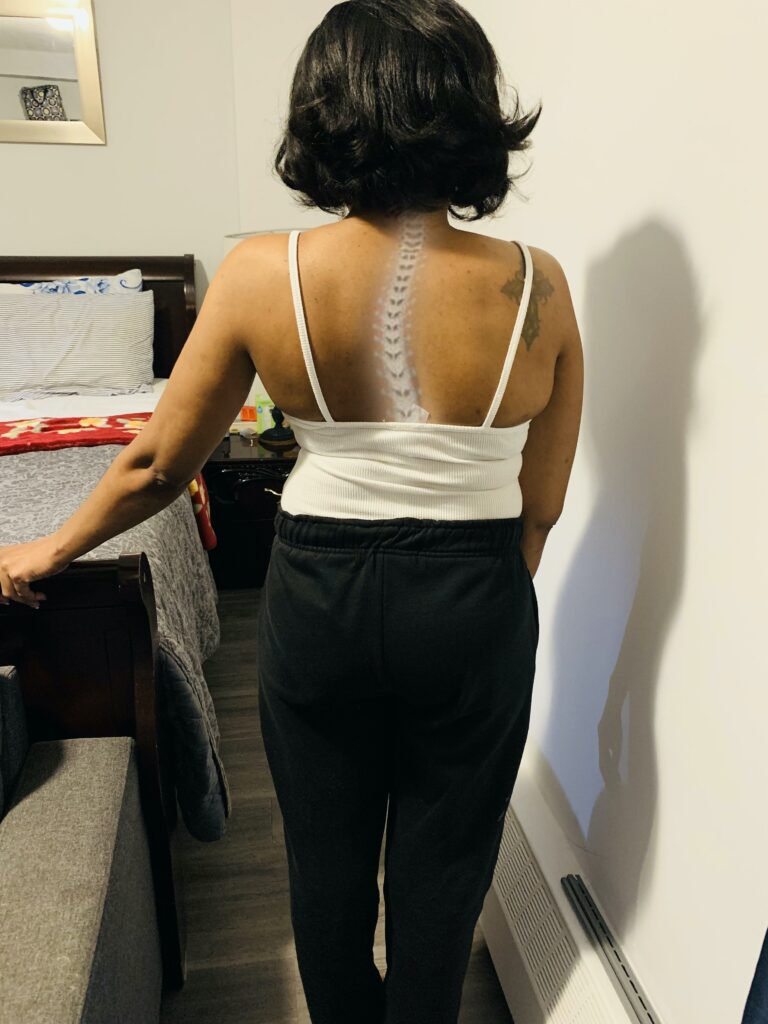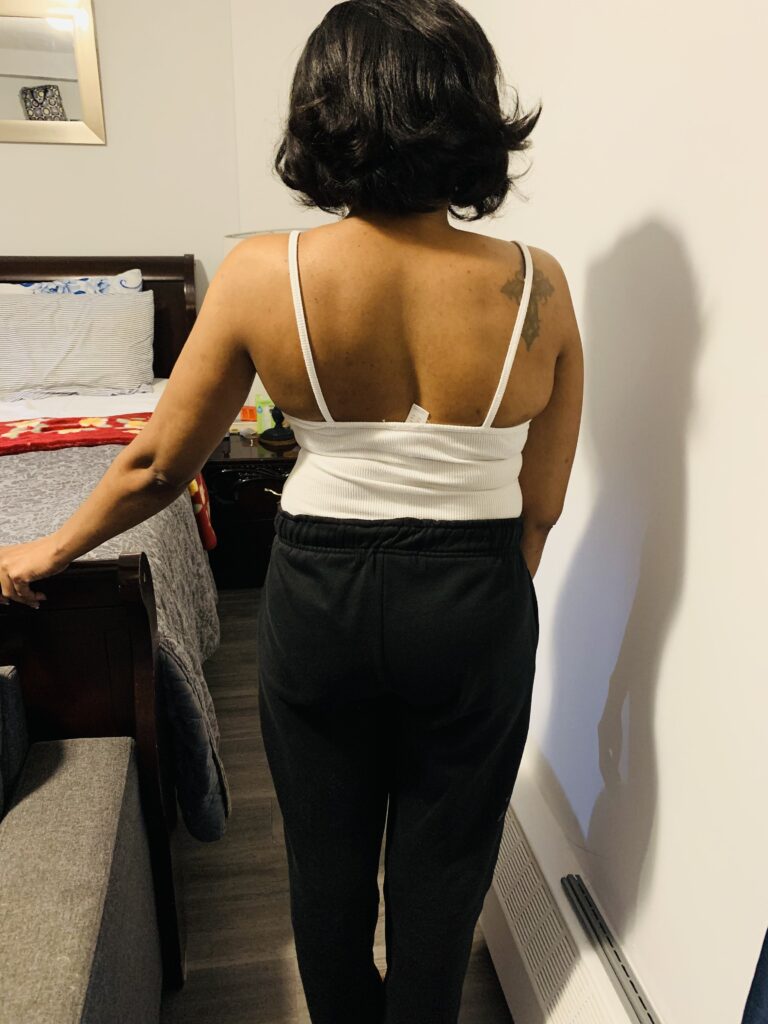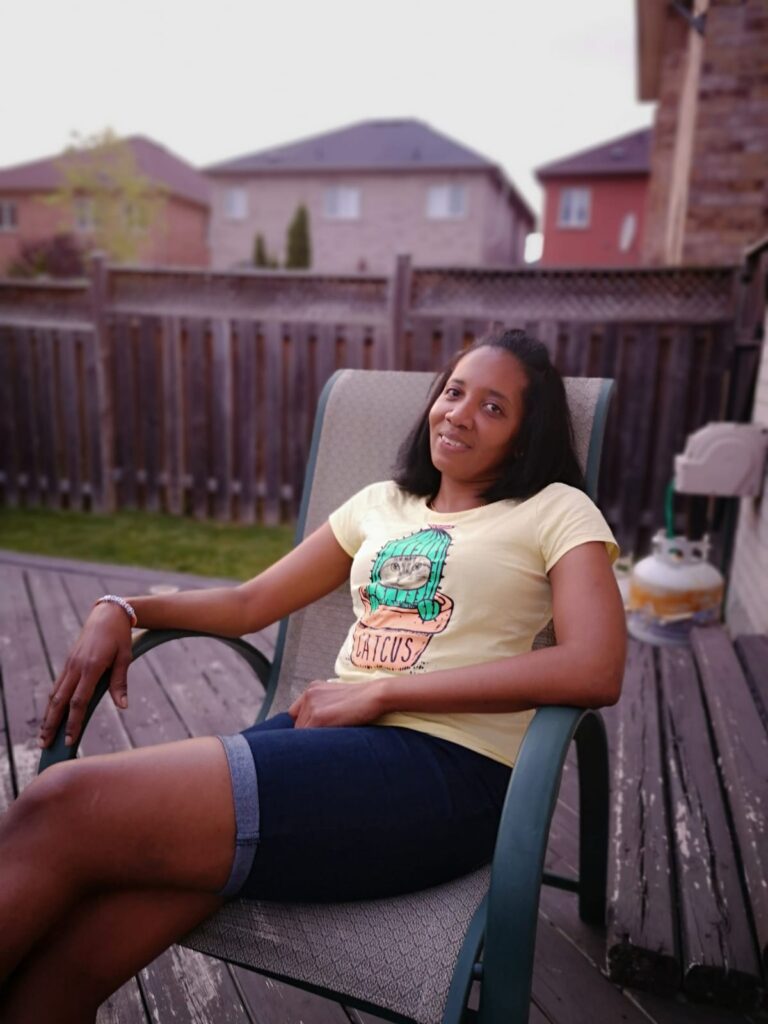By Felecia Francis
It’s 2015, a suitcase is being wheeled against the floor of the Norman Manley International Airport, in Kingston, Jamaica. In that suitcase lies more than clothing. It contains a bag of sand collected from the beach. The sand is a reminder that Jamaica is where she’s from, even though she will no longer call it home. But it also symbolizes her life — a life that is both heavy and beautiful at times.
And in that same blue suitcase is a new beginning. Dressed in a black summer dress and a jean jacket, Kamila Whyte makes her way down the long departure hall to board her flight. Her back aches immensely, but that does not stop her. This trip means everything to her. It means she will be living full-time with her husband whom she hasn’t seen in a while because of his worsening health condition.
But it is also a chance for a better life, financially and emotionally.
Suddenly, Kamila’s muscles start to contract. A tidal wave of pain bombards her like a storm crashing against a defenceless coastline, and in that brief moment everything stops.
“I could literally feel a shock going through my spine, and I released my luggage onto the floor. I couldn’t move.”
After what felt like hours, she regains her composure and continues to tread down the vast hallway, smiling briefly at the air hostess as she enters the plane. Her destination? Canada.
Six years later, Kamila at 42-year-old, lives in a two-bedroom apartment in Brampton, Ont., with her daughter and husband, who recently had a successful kidney transplant surgery and is slowly recovering from lupus. Kamila, on the other hand, does not have the luxury of slowing down.
Since Canada implemented measures to combat the spread of COVID-19 in March of last year, she has seen an increase in demand at her job as a cleaner in a Brampton apartment complex. She’s now disinfecting areas every 15-30 minutes rather than three times a day, putting tremendous pressure on her body.
“For me to even to move a certain type of box, there would be this little shock, telling me ‘Hey! I’m in the back.’”
Kamila was born and is still living with congenital scoliosis, the sideways curvature of the spine caused by a defect present at birth, and only visible as a child starts to go through puberty. The type of scoliosis that Kamila has makes it difficult for her to lift, push and pull heavy objects. It also makes it difficult for her to do repetitive work, even if there are breaks in between.
While scoliosis is a treatable condition, Kamila was unable to get surgery at a young age because of her family’s financial constraints. Now she can’t afford to take the time off from work to recover from surgery because she is the sole provider of her family.
Her family is dependent on her, so she has to ignore the acute pain she feels daily in order for her family to have food on the table.
Kamila represents many in Canada says Idil Abdillahi, an associate professor in the School of Disability Studies at Ryerson University.
“The story and lived experience of Kamila is indicative of what life is for many Black women in this country, which is to work both inside and outside of the home, to be dealing with multiple struggles and often to not be recognized as to be providing an essential service.”
Kamila always puts her family ahead of her health, no matter the challenges she faces, says her close friend of four years Sherion Davis.
“I look at it sometimes and I don’t know if I could do it, because she does work with pain sometimes… I have an appreciation for her, seeing her having to actually get up every day and come to work and to be doing this, knowing that she’s in pain and is uncomfortable.”
She returns from work in the evening and performs the same clockwork activity of cleaning and sanitizing her home. She sprays and wipes down every area of her apartment in an effort to protect her husband from any infection or viruses.
Between cleaning for eight hours at work, and having to go home to do the same thing, Kamila’s body barely rests.
Kamila’s life seems to be in a cyclical motion. She works, takes care of her family, and is a constant support to her friends. She does this repeatedly without ever thinking of the repercussions this might have on her and the burnout she risks.
This is far removed from her days as a child growing up in rural Jamaica. Back then the life before her seemed like a sea of uncharted waters and islands still to be explored.
In those days, she faced many hardships as a child while attending primary school in St. Thomas because of her slight hunch and left side that tilted inward, and the slew of bullying she encountered from kids and adults alike, who did not understand what it meant to be different, and the excruciating pain she was enduring every day. But she believes that her childhood was the pinnacle of her independence, something she no longer has.
One moment in Kamila’s childhood that she particularly loves, is a night spent with her brother and cousin.
It is Christmas time 1989. The downtown market square in Kingston, Jamaica is hosting the popular Grand Market, a Christmas tradition for generations of Jamaicans.
There are people shouting the prices of the items they have on sale. Music is blaring from speakers lined up on the roadside and in the shops of the downtown area with the very best of ’80s reggae, from Cocoa Tea to Frankie Paul.
Every shop is bathed in Christmas lights. Children let loose unbridled laughter as they run and play in a highly congested area. It’s jam-packed because people from all over Jamaica are congregating to do last-minute Christmas shopping, and children and young adults are allowed to stay out later than they usually would.
Smoke forms tiny clouds over the numerous jerk pans where people line up to eat a variety of sizzling jerk meats and festivals – a sweet deep-fried batter. Many are dressed in outfits that they specifically purchased for this day because, for many, Grand Market represents a night of total abandonment and a chance to be unsupervised for an entire night. And for Kamila at age 10, it represents one of the last moments in her life where she had no other obligation than to herself.
“Life was enjoyable because we were kids and we didn’t have any responsibilities.”
Kamila Whyte
That Christmas, Kamila, along with her brother and three cousins, took a 45-minute bus ride from Yallahs, St. Thomas to downtown. While downtown they bought sky juice – shaved ice with syrup, either in a small plastic bag or cup and fee-fees–– the Jamaican name for a party horn.
Life was enjoyable because we were kids and we didn’t have any responsibilities.”
Now her life is the stark contrast to those days. She can no longer stay out all night enjoying music and food because she has an 11-year-old daughter to wake up in the mornings for school and a husband who needs her when he cannot take care of himself.
“At that time I had more happiness, I could go anywhere and feel free…the freedom I had back then was freedom of spirit, mind, soul and body. When I went somewhere I had so much joy and new expectations.”







